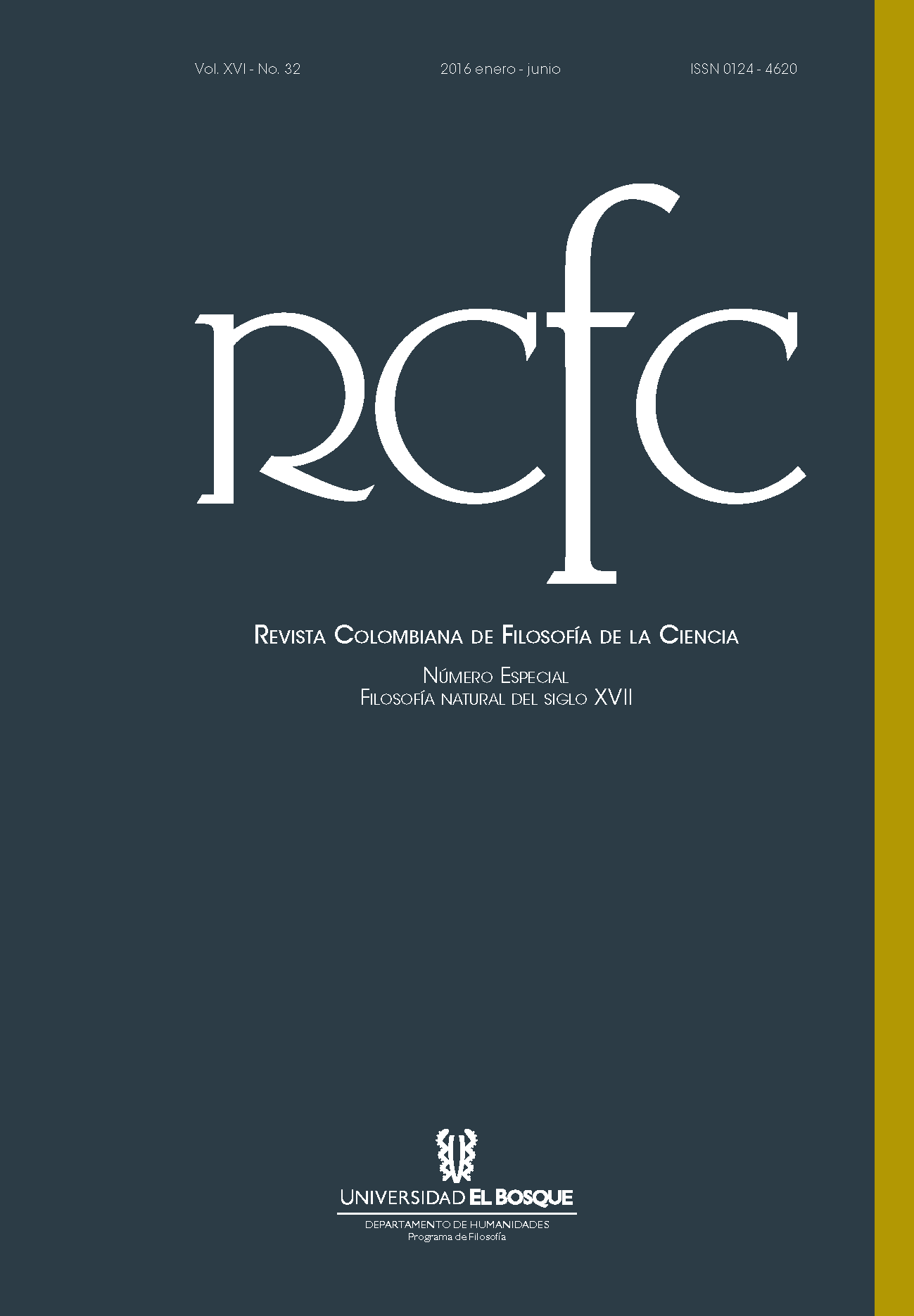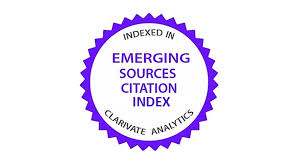Robert Boyle y John Locke
mecanicismo, percepción y teoría de las ideas
DOI:
https://doi.org/10.18270/rcfc.v16i32.1841Palabras clave:
Filosofía natural, Mecanicismo, Cualidades, Percepción, Siglo XVIIResumen
El objetivo de este trabajo es el de discutir las asunciones y consecuencias de la nueva ontología mecanicista de dos filósofos representantes de la filosofía natural del siglo XVII: John Locke y Robert Boyle. Se analizarán tres características comunes: en primer lugar, abordaremos las tesis acerca de la teoría de las ideas; trataremos de mostrar el modo en que ambas propuestas coinciden al establecer, por un lado, una metodología de investigación de la naturaleza acorde a los principios o límites de inspiración baconiana y otra “escéptica constructiva”. En segundo lugar, atenderemos las cercanías entre las tesis de ambos filósofos en torno a la explicación y la reducción mecanicista-corpuscularista de las cualidades y las formas. Aquí se abordará los principios para la Nueva ciencia, que tanto Locke como Boyle sostuvieron, en tanto que ambos pensadores trataban de dar un sentido crítico a las concepciones tradicionales de “esencia”, “forma” y “cualidad”. Finalmente, nos ocuparemos de las propuestas que se pueden encontrar en ambos filósofos naturales en lo que respecta a sus teorías de la percepción, concluyendo que existe una auténtica propuesta epistémica y ontológica, cuyos resultados se expresaron en los nuevos rumbos que adquirió la filosofía natural durante los siglos XVII y XVIII.
Descargas
Referencias bibliográficas
Anstey, Peter R. John Locke and Natural Philosophy. Oxford: Oxford University Press, 2013.
_____. “Locke, Bacon and Natural History”. Early Science and Medicine 7.1 (2002): 65-92.
Alexander, Peter. Ideas, Qualities and Corpuscles. Locke and Boyle on the External World. New York: Cambridge University, 1985.
Bacon, Francis. La gran restauración (Novum Organum). Trad., introd. y notas de Miguel Á. Granada. Madrid: Alianza, 1985.
Benítez, Laura y José A. Robles. De Newton y los newtonianos. Entre Descartes y Berkeley. De gravitatione et æquipondio fluidorum. De ære et ætere de Isaac Newton. Buenos Aires: Universidad Nacional de Quilmes, 2006.
Boyle, Robert. A Free Enquiry into the Vulgarly Received Notion of Nature. New York: Cambridge University, 1996.
_____. Física, química y filosofía mecánica. Trad. Carlos Solís Santos. Madrid: Alianza, 1985.
_____. Selected Philosophical Papers of Robert Boyle. Ed. M. A. Stewart. Indianapolis: Hackett, 1991.
Daston, Lorraine. “Probability and Evidence”. Eds. D. Garber y M. Ayers. The Cambridge History of Seventeenth-Century Philosophy 2 (2003): 1108-144.
Dijksterhuis, E. J. The Mechanization of the World Picture. Pytagoras to Newton. Princeton: Princenton University Press, 1986.
Farr, James. “The Way of Hypotheses: Locke on Method”. Journal of the History of Ideas. XLVIII.1 (1987): 51-72.
Garber, D., Henry, J., Joy, L., Gabbey, A. “New Doctrines of Body and its Powers, Place and Space”. Eds. D. Garber y M. Ayers. The Cambridge History of Seventeenth-Century Philosophy. 1 (2003): 553-623.
Hunter, Michael. “Robert Boyle and the Early Royal Society: A Reciprocal Exchange in the Making of Baconian Science”. The British Journal for the History of Science 40.1 (2007): 1-23.
Hunter, Michael y E. B. Davis. “The Making of Robert Boyle’s ‘Free Enquiry into the Vulgarly Receiv’d Notion of Nature’ (1686)”. Early Science and Medicine 1.2 (1996): 204-71.
Jenkins, Jane E. “Arguing about Nothing: Henry More and Robert Boyle on the Theological Implications of the Void”. Ed. Margaret Osler. Rethinking the Scientific Revolution. New York: Cambridge University, 2000. 153-79.
Jolley, Nicholas. Locke his Philosophical Thought. Oxford: Oxford University, 1999.
Kargon, Robert. “Walter Charleton, Robert Boyle and the Acceptance of Epicurean Atomism in England”. Isis 55.2 (1964):184-92.
Locke, John. An Essay Concerning Human Understanding. Ed. Peter H. Nidditch. Oxford: Oxford University Press, 1979.
_____. Ensayo sobre el entendimiento humano. Trad. Edmundo O’Gorman. Prólogo José A. Robles y Carmen Silva. México: Fondo de Cultura Económica, 1999.
_____. La conducta del entendimiento y otros ensayos póstumos. Trad. Ángel M. Lorenzo Rodríguez. Madrid: Anthropos, 1992.
Macintosh, J. J. “Robert Boyle on Epicurean Atheism and Atomism”. Atoms, Pneuma and Tranquillity. Epicurean and Stoic Themes in European Thought. Ed. Margaret J. Osler. New York: Cambridge University, 1991. 197-219.
McCann, Edwin. “Locke´s philosophy of body”. The Cambridge Companion to Locke. Ed. Vere Chappell. New York: Cambridge University Press, 1994.
Osler, Margaret J. Divine Will and the Mechanical Philosophy. Gassendi and Descartes on Contingency and Necessity in the Created World. New York: Cambridge University, 1994.
Popkin, Richard. The History of Scepticism. From Savonarola to Bayle. Oxford: Oxford University, 2003.
Robles García, José A. “Berkeley: ¿escéptico malgré lui?”. Filosofía natural y filosofía moral en la modernidad. Coords. Laura Benítez, Zuraya Monroy, José. A. Robles. México: Facultad de Psicología-UNAM, 2003. 211-21.
_____. “Espacio, materia y tiempo en cuatro filósofos atomistas. Epicuro (341-270), Tito Lucrecio Caro (+98-55), Francesco Patrizi (1529-1597) y Walter Charleton (1620-1707)”. Materia, espacio y tiempo: de la filosofía natural a la física. Coords. Laura Benítez y José A. Robles. México: FFyL-UNAM, 1999. 146-82.
Rogers, G. A. J. “Boyle, Locke and Reason”. Journal of the History of Ideas 27.2 (1966): 205-216.
Sargent, Rose-Mary. “Learning from Experience: Boyle’s Construction of an Experimental Philosophy”. Robert Boyle Reconsidered. Ed. Michael Hunter. New York: Cambridge University, 1994. 57-78.
_____. The Diffident Naturalist. Robert Boyle and the Philosophy of Experiment. Chicago: The University of Chicago, 1995.
Silva, Carmen. “Escepticismo, mecanicismo, teología y alquimia en Robert Boyle”. Theoria. Revista del Colegio de Filosofía 18 (2007): 11-23.
_____. “La reflexión boyleana sobre la noción de naturaleza”. Mecanicismo y modernidad. Coords. Laura Benítez y José A. Robles. México: Universidad del Claustro de Sor Juana, 2008. 121-36.
Sukopp, Thomas. “Robert Boyle, Baconian Science, and the Rise of Chemistry in Seventeenth Century”. Society and Politics 7.2 (2013): 54-76. Web. noviembre de 2014. <http://socpol.uvvg.ro/docs/2013-2/4.%20Thomas%20Sukpp.pdf>.
Toledo Marín, Leonel. “Tras las huellas del artesano: religión y filosofía natural en la modernidad temprana”. Libro Anual del ISEE 2006. Eds. F. Altbacht y Rafael Soto. México: Instituto Superior de Estudios Eclesiásticos, 2006. 85-105.
Van Leeuwen, Henry G. The Problem of Certainty in English Thought. 1630-1690. La Haya: Martinus Nijhoff, 1970.
Wocjick, Jan W. Robert Boyle and the Limits of Reason. New York: Cambridge University, 1997.

Descargas
Publicado
Cómo citar
Número
Sección
Licencia
Derechos de autor 2016 Revista Colombiana de Filosofía de la Ciencia

Esta obra está bajo una licencia internacional Creative Commons Atribución-NoComercial-SinDerivadas 4.0.










